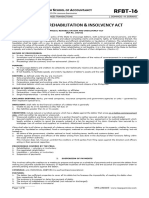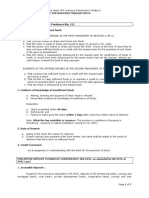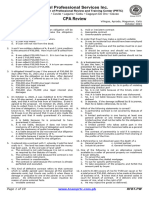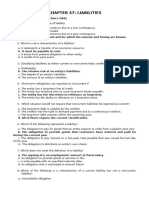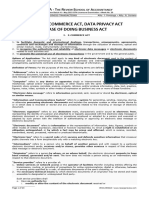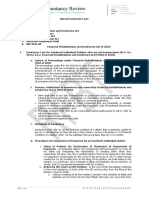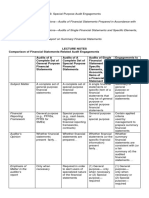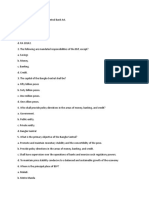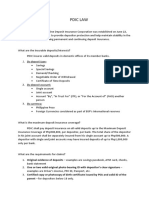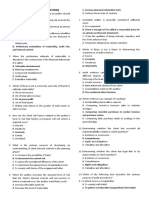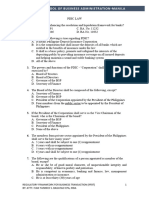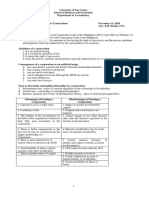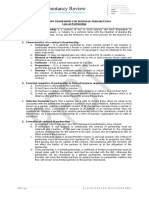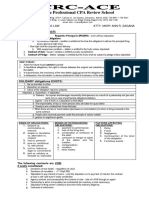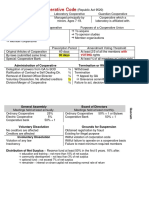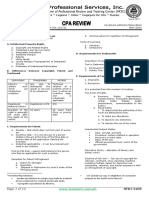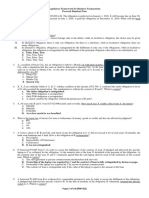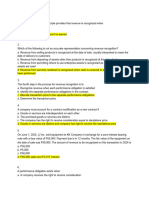RFBT 13 Banking Laws
RFBT 13 Banking Laws
Uploaded by
Kayceelin PasionCopyright:
Available Formats
RFBT 13 Banking Laws
RFBT 13 Banking Laws
Uploaded by
Kayceelin PasionCopyright
Available Formats
Share this document
Did you find this document useful?
Is this content inappropriate?
Copyright:
Available Formats
RFBT 13 Banking Laws
RFBT 13 Banking Laws
Uploaded by
Kayceelin PasionCopyright:
Available Formats
ReSA - THE REVIEW SCHOOL OF ACCOUNTANCY
CPA Review Batch 44 October 2022 CPA Licensure Examination
RFBT-13
REGULATORY FRAMEWORK for BUSINESS TRANSACTIONS J. DOMINGO N. SORIANO
BANKING LAWS
BANK SECRECY LAW (RA 1405, AS AMENDED)
❖ Purpose: to give encouragement to the people to deposit their money in banking institutions and to
discourage private hoarding so that the same may be properly utilized by banks in authorized loans to
assist in the development of the country
❖ Prohibited Act: It shall be unlawful for any official or employee of a bank to disclose to any person or
for an independent auditor hired by a bank to conduct its regular audit to disclose to any person other
than a bank director, official or employee authorized by the bank, any information concerning said
deposits.
❖ Deposits covered:
1. Peso deposits: All deposits of whatever nature with banks or banking institutions in the Philippines
including investments in bonds issued by the Government of the Philippines, its political subdivisions and
its instrumentalities, are considered absolutely confidential and may not be examined, inquired or looked
into by any person, government official, bureau or office, unless:
a. When there is a written permission of the depositor or investor
b. Impeachment cases
c. Upon the order of a competent court in cases of bribery or dereliction of duty of public officials
d. Upon the order of a competent court in cases where the money deposited or invested is the
subject of litigation
e. Upon order of the competent court or tribunal in cases involving unexplained wealth under RA
3019
f. Upon inquiry by the Commissioner of BIR for the purpose of determining the net estate of a
deceased depositor
g. Upon the order of a competent court or in proper cases by the AMLC where there is probable
cause of money laundering and in some instances even without court order
h. Disclosure to the Treasurer of the Philippines for dormant deposits for at least 10 years under the
Unclaimed Balances Act (RA 3936)
i. Report of banks to AMLC of covered and/or suspicious transactions
j. Upon order of the CA, examination by law enforcement officers in terrorism cases under the
Human Security Act of 2007 (RA 9372)
k. Examination is made in the course of a special or general examination of bank and is specifically
authorized by MB after being satisfied that there is reasonable ground to believe that a bank fraud
or serious irregularity has been or is being committed and that is necessary to look into the
deposit to establish such fraud or irregularity
l. Examination is made by an independent auditor hired by the bank to conduct its regular audit
provided that the examination is for audit purposes only and the results thereof shall be for the
exclusive use of the bank
2. Foreign currency deposits: except:
a. When there is written consent of depositor under Section 8 of the Foreign Currency Deposits Act
(RA 6426)
b. Under Section 11 of the Anti-Money Laundering Act (probable cause established that it is related
to an unlawful activity as defined or money laundering)
c. Under Section 27 and 28 of the Human Security Act (existence of probable cause in anti-terrorism
cases and those involving persons charged with or suspected of the crime of terrorism or
conspiracy to commit terrorism, judicially declared and outlawed terrorist organization,
association, or group of persons, or member of such organization, association, or group of
persons)
❖ Garnishment: Bank accounts may be garnished by the creditors of the depositor. The amount of deposit
is not actually disclosed, hence, no violation. Exceptions:
1. Foreign currency deposits, Section 8 of RA 6426 (Note: In Salvacion v. Central Bank, GR 94723,
August 21, 1997, foreign currency deposits made by a transient or a tourist is not the kind of deposit
protected by law. Hence, a dollar deposit made by a transient or a tourist may be subject to
garnishment.)
2. Exempt under Rules of Court
❖ Penalties for violation: imprisonment of not more than 5 years or a fine not more than P20,000.00 or
both
PDIC ACT (RA 3591, AS AMENDED)
❖ Basic Policy: promote and safeguard the interests of the depositing public by way of providing permanent
and continuing insurance coverage on all insured deposits
❖ Insured Deposit: amount due to any bona fide depositor for legitimate deposits in an insured bank net
of any obligation of the depositor to the insured bank as of the date of closure, but not to exceed
P500,000.00
Page 1 of 9 0915-2303213 www.resacpareview.com
ReSA – THE REVIEW SCHOOL OF ACCOUNTANCY
BANKING LAWS RFBT-13
Note: In case of a condition that threatens the monetary and financial stability of the banking system that
may have systemic consequences as determined by the MB, the maximum deposit insurance cover may
be adjusted in such amount, for such a period, and/or for such deposit products, as may be determined
by a unanimous vote of the Board of Directors in a meeting called for the purpose and chaired by the DOF
Secretary, subject to the approval of the President of the Philippines.
Under Section 22 of the PDIC Charter, a systemic risk refers to the possibility of failure of one bank to
settle net transactions with other banks will trigger a chain reaction, depriving other banks of funds
leading to a general shutdown of normal clearing and settlement activity. It also means the likelihood of
a sudden, unexpected collapse of confidence in a significant portion of the banking or financial system
with potentially large real economic effects.
❖ Coverage: The deposit liabilities of any bank or banking institution, which is engaged in the business of
receiving deposits as herein defined on the effective date of the PDIC Act, or which thereafter may engage
in the business of receiving deposits, shall be insured with the PDIC.
❖ Commencement of liability: PDIC shall commence the determination of insured deposits due the
depositors of a closed bank upon its actual takeover of the closed bank.
❖ Deposit accounts not entitled to payment:
1. Investment products such as bonds and securities, trust accounts and other similar instruments
2. Deposit accounts or transactions which are unfunded and that are fictitious or fraudulent
3. Deposit accounts or transactions constituting and/or emanating from, unsafe and unsound banking
practice/s, as determined by PDIC, in consultation with BSP, after due notice and hearing, and publication
of a cease-and-desist order issued by PDIC against such deposit accounts or transactions
4. Deposits that are determined to be the proceeds of an unlawful activity as defined under RA 9160, as
amended
❖ Per Depositor, Per Capacity Rule: all deposits in the bank maintained in the same right and capacity
for his benefit either in his own name or in the name of others
❖ Joint accounts: A joint account regardless of whether the conjunction “and”, “or”, “and/or” is used shall
be insured separately from any individually-owned deposit account, provided that:
1. If the account is held jointly by two or more natural persons, or by two or more juridical persons or
entities, the maximum insured deposit shall be divided into as many equal shares as there are individuals,
juridical persons or entities, unless a different sharing is stipulated in the document of deposit, and
2. If the account is held by a juridical person or entity jointly with one or more natural persons, the maximum
insured deposit shall be presumed to belong entirely to such juridical person or entity;
Provided, further, that the aggregate of the interest of each co-owner over several joint accounts, whether
owned by the same or different combinations of individuals, juridical persons or entities, shall likewise be
subject to the maximum insured deposit of P500,000.00.
No owner/holder of any negotiable certificate of deposit shall be recognized as a depositor entitled to the
rights in PDIC Act unless his name is registered as owner/holder thereof in the books of the issuing bank.
PDIC shall commence the determination of insured deposits due the depositors of a closed bank upon its
actual takeover of the closed bank. PDIC shall give notice to the depositors of the closed bank of the
insured deposits due them by whatever means deemed appropriate by the Board of Directors. PDIC shall
publish the notice once a week for at least 3 consecutive weeks in a newspaper of general circulation or,
when appropriate, in a newspaper circulated in the community or communities where the closed bank or
its branches are located.
Mode of payment: made as soon as possible either:
1. By cash
2. By making available to each depositor a transferred deposit in another insured bank in an amount equal
to insured deposit of such depositor
Note: The PDIC, in its discretion, may require proof of claims to be filed before paying the insured deposits,
and that in any case where the PDIC is not satisfied as to the validity of a claim, it may require final
determination of a court of competent jurisdiction before paying such claim. The PDIC may likewise
withhold payment of such portion of the insured deposit for the payment of any liability of such depositor
as a stockholder of the closed bank, or of any liability of such depositor to the closed bank or its receiver,
which is not offset against a claim due from such bank, pending determination and payment of such
liability by such depositor or any other liable therefor.
❖ Effect of payment: PDIC shall be subrogated to all rights of the depositor against the closed bank to the
extent of such payment. Such subrogation shall include the right on the part of PDIC to receive the same
dividends and payments from the proceeds of the assets of such closed bank and recoveries on account
of stockholders’ liability as would have been payable to the depositor on a claim for the insured deposits,
but such depositor shall retain his claim for any uninsured portion of his deposit.
Also, under Section 21 of the PDIC Charter, payment of an insured deposit to any person by PDIC shall
discharge the PDIC, and payment of transferred deposit to any person by the new bank or by an insured
Page 2 of 9 0915-2303213 www.resacpareview.com
ReSA – THE REVIEW SCHOOL OF ACCOUNTANCY
BANKING LAWS RFBT-13
bank in which a transferred deposit has been made available shall discharge PDIC and such new bank or
other insured bank, to the same extent that payment to such person by the closed bank would have
discharged it from liability for the insured deposit.
❖ Uninsured Portion: The depositor shall retain his or her claim for any uninsured portion of his or her
deposit, which legal preference shall be the same as that of the subrogated claim of PDIC for its payment
of insured deposits.
❖ Preference: All payments by PDIC of insured deposits in closed banks partake of the nature of public
funds, and as such, must be considered a preferred credit similar to taxes due to the National Government
in the order of preference under Article 2244(9) of NCC, provided further, that this preference shall be
likewise effective upon liquidation proceedings already commenced and pending as of the approval of
PDIC Act, where no distribution of assets has been made.
❖ Failure to settle claim of insured depositor: Failure to settle the claim within 6 months from the date
of filing of claim for insured deposit, where such failure was due to grave abuse of discretion, gross
negligence, bad faith or malice, shall upon conviction, subject the directors, officers or employees of PDIC
responsible for the delay, to imprisonment from 6 months to one year, provided, that the period shall not
apply if the validity of the claim requires the resolution of issues of facts and/or law by another office,
body or agency.
❖ Failure of depositor to claim insured deposits: Unless otherwise waived by the PDIC, if the depositor
in the closed bank shall fail to claim his insured deposits with PDIC within 2 years from actual takeover
of the closed bank by the receiver, or does not enforce his claim filed with PDIC within 2 years after the
2-year period to file a claim, all rights of the depositor against the PDIC with respect to the insured deposit
shall be barred, however, all rights of the depositor against the closed bank and its shareholders or the
receivership estate to which PDIC may have become subrogated, shall thereupon revert to the depositor.
Thereafter, PDIC shall be discharged from any liability on the insured deposit.
❖ PDIC’s regulatory oversight:
1. Conduct of special bank examinations
2. Determination of products eligible for deposit insurance
3. Examination of deposit accounts of ailing banks: In the event that there is a finding of unsafe and unsound
banking practice, PDIC is authorized to examine deposits, as an exemption from Bank Secrecy Law
❖ Splitting of deposits: occurs whenever a deposit account with an outstanding balance of more than the
statutory maximum amount of insured deposit maintained under the name of natural or juridical persons
is broken down and transferred into 2 or more accounts in the name/s of natural or juridical persons or
entities who have no beneficial ownership on transferred deposits in their names within 120 days
immediately preceding or during a bank declared bank holiday or immediately preceding a closure order
issued by the MB of BSP for the purpose of availing of the maximum deposit insurance coverage;
prohibited; punishable by imprisonment of not less than 6 years but not more than 12 years or a fine not
less than P50,000 but not more than P10,000,000, or both, at the discretion of the court.
❖ Injunction: No court, except the CA, shall issue any TRO, preliminary injunction or preliminary
mandatory injunction against PDIC for any action under PDIC Act. The SC may issue a restraining order
or injunction when the matter is of extreme urgency involving a constitutional issue, such that unless a
TRO is issued, grave injustice and irreparable injury will arise.
ANTI-MONEY LAUNDERING ACT (RA 9160, AS AMENDED)
❖ Policy: To protect and preserve the integrity and confidentiality of bank accounts and to ensure that the
Philippines shall not be used as a money-laundering site for the proceeds of any unlawful activity.
Consistent with its foreign policy, the State shall extend cooperation in transnational investigations and
prosecutions of persons involved in money laundering activities whenever committed.
❖ Money Laundering: a crime whereby the proceeds of an unlawful activity are transacted, thereby
making them appear to have originated from legitimate sources
❖ How committed:
1. Any person knowing that any monetary instrument or property represents, involves or relates to, the
proceeds of any unlawful activity:
a. Transacts said money instrument or property;
b. Converts, transfers, disposes of, moves, acquires, possesses or uses said monetary instrument
or property;
c. Conceals or disguises the true nature, source, location, disposition, movement or ownership of or
rights with respect to said monetary instrument or property;
d. Attempts or conspires to commit money laundering offenses referred to in (a), (b) or (c);
e. Aids, abets, assists in or counsels the commission of the money laundering offenses referred to
in (a), (b) or (c); and
f. performs or fails to perform any act as a result of which he facilitates the offense of money
laundering referred to in (a), (b) or (c).
2. Any person knowing that a covered or suspicious is required to be reported to the AMLC, fails to do so
Page 3 of 9 0915-2303213 www.resacpareview.com
ReSA – THE REVIEW SCHOOL OF ACCOUNTANCY
BANKING LAWS RFBT-13
❖ Prosecution: Any person may be charged with and convicted of both the offense of money laundering
and the unlawful activity. The prosecution of any offense under AMLA shall proceed independently of any
proceeding relating to the unlawful activity.
❖ Covered Transaction: a transaction in cash or other equivalent monetary instrument involving a total
amount in excess of P500,000.00 within one banking day; for covered persons like casinos, a single casino
cash transaction (involving the receipt of cash by a casino paid by or behalf of a customer or payout of
cash by a casino to a customer or to any person in his/her behalf) involving an amount in excess of
P5,000,000 or its equivalent in any other currency
❖ Covered Persons: (natural or juridical)
1. Banks, non-banks, quasi-banks, trust entities, foreign exchange dealers, pawnshops, money changers,
remittance and transfer companies and other similar entities and other similar entities and all other
persons and their subsidiaries and affiliates supervised or regulated by the BSP;
2. Insurance companies, pre-need companies and other persons supervised or regulated by the Insurance
Commission;
3. (i) Securities dealers, brokers, salesmen, investment houses and other similar persons managing
securities or rendering services as investment agent, advisor, or consultant, (ii) mutual funds, close-end
investment companies, common trust funds, and other similar persons, and (iii) other entities
administering or otherwise dealing in currency, commodities or financial derivatives based thereon,
valuable objects, cash substitutes and other similar monetary instruments or property supervised and
regulated by SEC;
4. Jewelry dealers in precious stones, who, as a business, trade in precious stones, for transactions in excess
of P1,000,000;
5. Jewelry dealers in precious metals, who, as a business, trade in precious metals, for transactions in excess
of P1,000,000;
6. Company service provides which, as a business, provide any of the following services to third parties: (i)
acting as a formation agent of juridical persons; (ii) acting as (or arranging for another person to act as)
a director or corporate secretary of a company, a partner of a partnership, or a similar position in relation
to other juridical persons; (iii) providing a registered office, business address or accommodation,
correspondence or administrative address for a company, a partnership or any other legal person or
arrangement; and (iv) acting as (or arranging for another person to act as) a nominee shareholder for
another person;
7. Persons who provide any of the following services:
a. Managing of client money, securities or other assets;
b. Management of bank, savings or security accounts;
c. Organization of contributions for the creation, operation or management of companies; and
d. Creation, operation or management of juridical persons or arrangements, and buying and selling
business entities.
8. Casinos, including internet and ship-based casinos, with respect to their casino cash transactions related
to their gaming operations
❖ Excluded Persons: lawyers and accountants acting as independent legal professionals in relation to
information concerning their clients or where disclosure of information would compromise client
confidences or the attorney-client relationship
❖ Obligations of covered institutions:
1. Customer identification: Covered persons shall establish and record the true identity of its clients based
on official documents.
2. Record keeping: All records of all transactions of covered institutions shall be maintained and safely stored
for 5 years from the date of transactions.
3. Reporting of covered and suspicious transactions: Covered persons shall report to the AMLC all covered
transactions and suspicious transactions within 5 working days from occurrence thereof, unless the AMLC
concerned prescribes a different period not exceeding 15 working days.
4. Should a transaction be determined to be both a covered and a suspicious transaction, it shall be reported
as a suspicious transaction.
5. When reporting, it shall not be considered a violation of bank secrecy laws and similar laws. It shall be
prohibited from communicating, directly or indirectly, in any manner or by any means, to any person the
fact that a covered or suspicious transaction report was made, the content thereof, or any other
information in relation thereto.
6. Safe Harbor: No administrative, criminal, or civil proceedings, shall lie against any person for having made
a transaction report in the regular performance of his duties and in good faith, whether or not such results
in any criminal prosecution under Philippine laws.
❖ Suspicious Transaction: transactions with covered institutions, regardless of the amount involved,
where any of the following circumstances exist:
1. There is no underlying legal or trade obligation, purpose or economic justification
2. The client is not properly identified
3. The amount involved is not commensurate with the business or financial capacity of the client
4. Taking into account all known circumstances, it may be perceived that the client’s transaction is structured
in order to avoid being the subject of reporting requirements under the Act
5. Any circumstances relating to the transaction which is observed to deviate from the profile of the client
and/or the client’s past transactions with the covered institution
Page 4 of 9 0915-2303213 www.resacpareview.com
ReSA – THE REVIEW SCHOOL OF ACCOUNTANCY
BANKING LAWS RFBT-13
6. The transaction is in any way related to an unlawful activity or offense under this Act that is about to be,
is being or has been committed
7. Any transaction that is similar or analogous to any of the foregoing
❖ Unlawful activities: Any act or omission or series or combination thereof involving or having relation to
the following:
1. Kidnapping for ransom under Article 267 of RPC
2. Sections 4, 5, 7, 8, 9, 10, 12, 13, 14, 15 and 16 of Comprehensive Dangerous Drugs Act (RA 9165)
a. Importation of prohibited drugs
b. Sale of prohibited drugs
c. Administration of prohibited drugs
d. Distribution of prohibited drugs
e. Transportation of prohibited drugs
f. Maintenance of a den, dive, or resort for prohibited users
g. Manufacture of prohibited drugs
h. Possession of prohibited drugs
i. Use of prohibited drugs
j. Cultivation of plants which are sources of prohibited drugs
k. Culture of plants which are sources of prohibited drugs
3. Section 3, paragraphs B, C E, G, H and I of RA 3019
a. Directly or indirectly requesting or receiving any gift, present, share, percentage, or benefit for
himself or for any other person in connection with contract or transaction between the
Government and any party, wherein the public officer in his official capacity has to intervene
under the law
b. Directly or indirectly requesting or receiving any gift, present, or other pecuniary or material
benefit, for himself or for another, from any person for whom the public officer, in any manner or
capacity, has secured or obtained, or will secure or obtain, any government permit or license, in
consideration for the help given or to be given
c. Causing any undue injury to any party, including the government, or giving any private party any
unwarranted benefits, advantage, or preference in the discharge of his official, administrative, or
judicial functions through manifest partiality, evident bad faith, or gross inexcusable negligence
d. Entering, on behalf of the government, into any contract or transaction manifestly and grossly
disadvantageous to the same, whether or not the public officer profited or will profit thereby
e. Directly or indirectly having financial or pecuniary interest in any business contract or transaction
in connection with which he intervenes or takes part in his official capacity, or in which he is
prohibited by the Constitution or by any law from having any interest
f. Directly or indirectly becoming interested, for personal gain, or having material interest in any
transaction or act requiring the approval of a board, panel, or group of which he is a member,
and which exercise of discretion in such approval, even if he votes against the same or he does
not participate in the action of the board, committee, panel, group
4. Plunder under RA 7080
5. Robbery and extortion under Articles 294, 295, 296, 299, 300, 301 and 302 of RPC
a. Robbery with violence or intimidation of persons
b. Robbery with physical injuries, committed in an uninhabited place and by a band, or with use of
firearms on a street, road, or alley
c. Robbery in an uninhabited house or public building or edifice devoted to worship
6. Jueteng and masiao under PD 1602
7. Piracy on the high seas under RPC and PD 532
a. Piracy on the high seas
b. Piracy in inland Philippine waters
c. Aiding and abetting pirates and brigands
8. Qualified theft under Article 310 of RPC
9. Swindling under Article 315 of RPC
10. Smuggling under RA 455 and RA 1937
11. Violations of Electronic Commerce Act (RA 8792)
12. Hijacking and other violations under RA 6235
13. Destructive arson and murder as defined under RPC
14. Terrorism and conspiracy to commit terrorism under Sections 3 and 4 of RA 9372
15. Financing terrorism under Section 4 and offenses punishable under Sections 5, 6, 7, and 8 of RA 10168
16. Bribery under Articles 210, 211 and 211-A of RPC and corruption of public officers under Article 212 of
RPC
17. Frauds and illegal exactions and transactions under Articles 213, 214, 215 and 216 of RPC
18. Malversation of public funds and property under Articles 217 and 222 of RPC
19. Forgeries and counterfeiting under Articles 163, 166, 167, 168, 169 and 176 of RPC
20. Violations of Sections 4, 5 and 6 of RA 9208 (Anti-Trafficking in Persons Act)
21. Violations of Sections 86 to 106 of Chapter VI of RA 8550 (Philippine Fisheries Code)
22. Violations of Sections 101 to 107 and 110 of RA 7942 (Philippine Mining Act)
23. Violations of Section 27(c), (e), (f), (g) and (i) of RA 9147 (Wildlife Resources Conservation and Protection
Act)
24. Violation of Section 7(b) of RA 9072 (National Caves and Cave Resources Management Protection Act)
25. Violation of RA 6539 (Anti-Carnapping Act)
26. Violations of Section 1, 3 and 5 of PD 1866 (Illegal/Unlawful Possession of Firearms and Explosives)
Page 5 of 9 0915-2303213 www.resacpareview.com
ReSA – THE REVIEW SCHOOL OF ACCOUNTANCY
BANKING LAWS RFBT-13
27. Violation of PD 1612 (Anti-Fencing Law)
28. Violation of Section 6 of RA 8042 (Migrant Workers Act)
29. Violation of RA 8293 (Intellectual Property Code)
30. Violation of Section 4 of RA 9995 (Anti-Photo and Video Voyeurism Act)
31. Violation of Section 4 of RA 9775 (Anti-Child Pornography Act)
32. Violations of Sections 5, 6, 7, 8, 9, 10(c), (d) and €, 11, 12 and 14 of RA 7610 (Special Protection of
Children)
33. Fraudulent practices and other violations under RA 8799 (Securities Regulation Code)
34. Felonies or offenses of a similar nature that are punishable under the penal laws of other countries
❖ Jurisdiction:
1. Regional Trial Court: all cases on money laundering
2. Sandiganbayan: if committed by public officers and private persons who are in conspiracy with such public
officers
❖ AMLC: composed of:
1. Chairman: BSP Governor
2. Members:
a. Commissioner of Insurance Commission
b. Chairman of SEC
Note: It shall act unanimously in discharging its functions.
❖ Functions of AMLC:
1. To require and receive covered transaction reports from covered institutions
2. To issue orders addressed to the appropriate Supervising Authority or the covered institution to determine
the true identity of any monetary instrument or property subject of a covered transaction report or request
for assistance from a foreign State, or believed by the Council, on the basis of substantial evidence to be
in whole or in part, whenever located, representing, involving or related to, directly or indirectly, in any
manner or by any means, the proceeds of an unlawful activity
3. To institute civil forfeiture proceedings and all other remedial proceedings through the OSG
4. To cause the filing of complaints with the DOJ or Ombudsman for the prosecution of money laundering
offenses
5. To initiate investigations of covered transactions, money laundering activities and other violations of RA
9160
6. To freeze any monetary instrument or property alleged to be proceeds of any unlawful activity
7. To implement such measures as may be necessary and justified under RA 9160 to counteract money
laundering
8. To receive and take action in respect of, any request from foreign states for assistance in their own anti-
money laundering operations provided in RA 9160
9. To develop educational programs on the pernicious effects of money laundering, the methods and
techniques used in money laundering, the viable means of preventing money laundering and the effective
ways of prosecuting and punishing offenders
10. To enlist the assistance of any branch, department, bureau, office, agency or instrumentality of the
government, including GOCCs, in undertaking any and all anti-money laundering operations, which may
include the use of its personnel, facilities and resources for the more resolute prevention, detection and
investigation of money laundering offenses and prosecution of offenders.
11. To impose administrative sanctions for the violation of laws, rules, regulations, orders, and resolutions
issued pursuant to law
❖ Freezing: The CA, upon application ex parte by AMLC and after determination that probable cause exists
that any monetary instrument or property is in any way related to an unlawful activity, may issue a freeze
order which shall be effective immediately (for a period of 20 days unless extended by the court upon
application by the AMLC; total period shall not exceed 6 months).
Note: Considering the intricate and diverse web of related and interlocking accounts pertaining to the
monetary instruments or properties that any person may create in the different covered institutions, their
branches and/or other units, AMLC may apply to freeze monetary instruments or properties in the names
of the reported owners/holders, and monetary instruments or properties named in the application of the
AMLC, including all other related web of accounts pertaining to other monetary instruments and
properties, the funds and sources of which originated from or are related to the monetary instruments or
properties subject of the freeze orders.
❖ Related Web of Accounts: those accounts, the funds and sources of which originated from and/or are
materially linked to the monetary instruments or properties subject of the freeze orders.
❖ Authority to inquire into bank deposits: The AMLC may inquire into deposits upon order of the court
when there is probable cause that the deposits are related to the crime or unlawful activities. However,
a court order is not even necessary when the offense or unlawful activity involved is any of the following:
1. Kidnapping for ransom under Article 267 of RPC
2. Sections 4, 5, 7, 8, 9, 10, 12, 13, 14, 15 and 16 of Comprehensive Dangerous Drugs Act (RA 9165)
3. Hijacking and other violations under RA 6235
4. Destructive arson and murder as defined under RPC
5. Felonies or offenses of a nature similar to (1), (2), (3) and (4) which are punishable under the penal laws
of other countries
6. Terrorism and conspiracy to commit terrorism under RA 9372
7. Financing terrorism under Section 4 and offenses punishable under Sections 5, 6, 7, and 8 of RA 10168
Page 6 of 9 0915-2303213 www.resacpareview.com
ReSA – THE REVIEW SCHOOL OF ACCOUNTANCY
BANKING LAWS RFBT-13
Inquiry into deposits may be availed of even in the absence of a pre-existing criminal case under the same
law. However, the order authorizing bank inquiry cannot be issued ex parte.
❖ Authority to institute civil forfeiture proceedings: The AMLC is authorized to institute civil forfeiture
proceedings and all other remedial proceedings through the Office of the Solicitor General, upon
determination that probable cause exists that any monetary instrument or property is in any way related
to an unlawful activity or a money laundering offense.
TRUTH IN LENDING ACT
It is the policy of the State to protect its citizens from a lack of awareness of the true cost of credit to the
user by assuring a full disclosure of such cost with a view of preventing the uninformed use of credit to the
detriment of the national economy.
Definition of Terms
(1) "Board" means the Monetary Board of the Central Bank of the Philippines
(2) "Credit" means any loan, mortgage, deed of trust, advance, or discount; any conditional sales contract;
any contract to sell, or sale or contract of sale of property or services, either for present or future delivery, under
which part or all of the price is payable subsequent to the making of such sale or contract; any rental-purchase
contract; any contract or arrangement for the hire, bailment, or leasing of property; any option, demand, lien,
pledge, or other claim against, or for the delivery of, property or money; any purchase, or other acquisition of,
or any credit upon the security of, any obligation of claim arising out of any of the foregoing; and any transaction
or series of transactions having a similar purpose or effect
(3) "Finance charge" includes interest, fees, service charges, discounts, and such other charges incident to
the extension of credit as the Board may be regulation prescribe
(4) "Creditor" means any person engaged in the business of extending credit (including any person who as
a regular business practice make loans or sells or rents property or services on a time, credit, or installment basis,
either as principal or as agent) who requires as an incident to the extension of credit, the payment of a finance
charge
(5) "Person" means any individual, corporation, partnership, association, or other organized group of
persons, or the legal successor or representative of the foregoing, and includes the Philippine Government or any
agency thereof, or any other government, or of any of its political subdivisions, or any agency of the foregoing
As such, Any creditor shall furnish to each person to whom credit is extended, prior to the consummation of the
transaction, a clear statement in writing setting forth, to the extent applicable and in accordance with rules and
regulations prescribed by the Board, the following information: (1) the cash price or delivered price of the property
or service to be acquired; (2) the amounts, if any, to be credited as down payment and/or trade-in; (3) the
difference between the amounts set forth under clauses (1) and (2); (4) the charges, individually itemized, which
are paid or to be paid by such person in connection with the transaction but which are not incident to the extension
of credit; (5) the total amount to be financed; (6) the finance charge expressed in terms of pesos and centavos;
and (7) the percentage that the finance bears to the total amount to be financed expressed as a simple annual
rate on the outstanding unpaid balance of the obligation
The disclosure statement in writing is a required attachment to the credit transaction contract. The borrower
has a right to demand a copy of the disclosure statement. It is not just banks and other financial institutions that
must follow these requirements. Any person in the business of extending loans, or selling or renting property or
services on a time, credit, or installment basis, either as principal or as agent, is required to make the same
written disclosure.
In the case of Development Bank of the Philippines vs Arcilla, the creditor’s failure to comply with these
requirements does not mean that the debt is forgiven, or that the goods purchased on credit or installment basis
are deemed fully paid. The transactions remain valid and enforceable. The lender, however, will have no right to
collect such charge or increases thereof, even if stipulated in the promissory note.
In UCPB vs Veloso, the SC held that a promissory note which grants the creditor the power to unilaterally fix
the interest rate means that the promissory note does not contain a clear statement in writing of the finance
charge.
Such provision is illegal not only because it violates the principle of mutuality of contracts but it also
contravenes the Truth in Lending law. In case there is a violation, the borrower may file a civil case for recovery
of damages in the amount of Php 100 or of twice the finance charged required by the creditor, whichever is
greater, but not to exceed P2,000. A criminal case may also be filed against the creditor. The action to recover
the penalty should be brought within one year from the date of the occurrence of the violation.
PDIC LAW
1. All deposits of any bank are insured with the:
A. BSP C. PDIC
B. Insurance Commission D. Monetary Board
2. Insured deposit means the net amount due to any depositor for deposits in an insured bank but should
not exceed:
A. P1,000,000 C. P250,000
B. P500,000 D. P300,000
Page 7 of 9 0915-2303213 www.resacpareview.com
ReSA – THE REVIEW SCHOOL OF ACCOUNTANCY
BANKING LAWS RFBT-13
3. Under the PDIC Law, a joint account held by a juridical person or entity jointly with a natural person
shall be presumed to belong to the:
A. Juridical person C. Both the juridical and natural persons
B. Natural person D. One who first files the claim
4. The proceeds of the insurance shall be paid by the PDIC to the depositor whenever:
A. The depositor files the claim with supporting documents
B. The insured bank submits the list of qualified depositors
C. The insured bank is closed on account of insolvency
D. The order from the BSP to pay is issued
5. The claim must be filed within how many years from the actual takeover by the receiver?
A. 5 B. 3 C. 2 C. 1
BANK SECRECY
6. All deposits of whatever nature with banks or banking institutions in the Philippines including investments
in bonds issued by the Government of the Philippines, its political subdivisions and its instrumentalities, are
considered __ and may not be examined, inquired or looked into by any person, government official, bureau
or office.
A. Totally confidential C. Definitely confidential
B. Generally confidential D. Absolutely confidential
7. In order for a depositor or investor to waive the secrecy of his deposits and/or investments, his waiver
must be:
A. In writing
B. Made orally or in writing
C. Communicated as soon as possible to the bank manager
D. Made orally only
8. The secrecy of foreign currency deposits are not applicable (1) when there is written consent of
depositor, (2) under Section 11 of the Anti-Money Laundering Act, and (3) under Sections 27 and 28 of the
Human Security Act.
A. 1 and 2 only C. All of three
B. 1 and 3 only D. All of three
9. There is no secrecy of bank deposits when the banks report to the Anti-Money Laundering Council the
following transaction/s:
A. Covered only
B. Suspicious only
C. Covered and/or suspicious
D. None can be reported without violating the secrecy of bank deposits
10. There is no secrecy of bank deposits if ordered by the __, the examination by law enforcement officers
in terrorism cases.
A. Regional Trial Court C. Municipal Trial Court
B. Court of Appeals D. Supreme Court
11. Who may inquire into the bank deposits and investment for the purpose of determining the net estate of
a deceased depositor and investor?
A. Commissioner of Internal Revenue
B. Assistant Commissioner of Internal Revenue
C. BIR Regional Director
D. BIR Examiner
12. Which court can order the disclosure of bank deposits in cases where the money deposited or invested
is the subject of litigation?
A. Court of Appeals C. Supreme Court
B. Regional Trial Court D. Any competent court
ANTI-MONEY LAUNDERING
13. Suspicious transactions refer to transactions with covered institutions, regardless of the amount
involved, where any of the following circumstances exist:
A. No underlying legal or trade obligation, purpose or economic justification
B. Client is properly identified
C. Amount involved commensurate with client’s business or financial capacity
D. Based on all known circumstances, it may be perceived that client’s transaction is not structured in
order to avoid being subject of reporting requirements
14. Jewelry dealer is a covered institution if it deals in precious metals, who as a business or trade in excess
of:
A. P10,000,000 C. P1,000,000
B. P5,000,000 D. P500,000
15. A covered person is obligated to keep records for how many years?
A. 5 B. 4 C. 3 C. 2
Page 8 of 9 0915-2303213 www.resacpareview.com
ReSA – THE REVIEW SCHOOL OF ACCOUNTANCY
BANKING LAWS RFBT-13
16. A covered person is obligated to report covered and/or suspicious transactions to AMLC within how
many days from occurrence?
A. 5 working days C. 7 working days
B. 5 calendar days D. 7 calendar days
17. The AMLC can prescribe a different period for reporting covered and/or suspicious transactions to AMLC
as long as it does not exceed:
A. 10 working days C. 15 working days
B. 10 calendar days D. 15 calendar days
18. Which professionals are not required to report covered and/or suspicious transactions if the relevant
information was obtained in circumstances where they are subject to professional secrecy or legal
professional privilege?
A. Lawyers and accountants C. Accountants only
B. Lawyers only D. All professionals are required
19. Should a transaction be determined to be both a covered transaction and a suspicious transaction, the
covered institution shall be required to report the same as a:
A. Covered transaction
B. Suspicious transaction
C. Both a suspicious and covered transaction
D. At the election of the covered institution
20. All cases on money laundering shall be within the jurisdiction of:
A. Regional Trial Courts (RTC) C. Sandiganbayan (SB)
B. Court of Appeals (CA) D. Court of Tax Appeals (CTA)
21. Acts of money laundering committed by public officers, and private persons in conspiracy with such
public officers shall be within the jurisdiction of:
A. Regional Trial Courts (RTC) C. Court of Appeals (CA)
B. Sandiganbayan (SB) D. Court of Tax Appeals (CTA)
22. It is an extraordinary and interim relief issued to prevent the dissipation, removal, or disposal of
properties that are suspected to be the proceeds of, or related to, unlawful activities as defined in RA9160:
A. Status quo ante order C. Writ of injunction
B. Temporary restraining order D. Freeze order
23. The power to freeze accounts is vested unto:
A. AMLC C. Court of Tax Appeals (CTA)
B. Court of Appeals (CA) D. Supreme Court (SC)
24. What are the requisites for issuance of freeze order?
A. Application ex parte by AMLC only
B. Determination of probable cause by CA only
C. Application ex parte by AMLC and determination of probable cause by CA
D. Application ex parte by AMLC and determination of probable cause by AMLC
25. The Court should act on the petition to freeze within how many hours from filing thereof?
A. 24 B. 36 C. 48 C. 72
26. A freeze order shall be effective immediately for a period not to exceed:
A. 6 months B. 3 months C. 1 month C. 20 days
27. A freeze order may be extended for a period not exceeding:
A. 6 months B. 3 months C. 1 month C. 1 year
28. Who serves as Chairman of the AMLC?
A. SEC Chairman C. Insurance Commission Chairman
B. BSP Governor D. DOF Secretary
29. AMLC may conduct an examination of bank accounts without a court order in cases involving:
A. Kidnapping for ransom C. Plunder
B. Drug possession D. Robbery and extortion
1. C 11. A 21. B
2. B 12. D 22. D
3. A 13. A 23. B
4. C 14. C 24. C
5. C 15. A 25. A
6. D 16. A 26. C
7. A 17. C 27. A
8 C 18. A 28. B
9. C 19. B 29. A
10. B 20. A
Page 9 of 9 0915-2303213 www.resacpareview.com
You might also like
- Resa Ip Law Resa RFBT Handouts For Intellectual Property Code LawDocument13 pagesResa Ip Law Resa RFBT Handouts For Intellectual Property Code LawFrances Glei FaminialNo ratings yet
- Nfjpia Nmbe RFBT 2017 Ans1Document8 pagesNfjpia Nmbe RFBT 2017 Ans1Harvey CalabiaNo ratings yet
- RFBT-13 (Banking Laws)Document10 pagesRFBT-13 (Banking Laws)Alliah Mae ArbastoNo ratings yet
- RFBT-16 (Financial Rehabilitation - Insolvency Act)Document8 pagesRFBT-16 (Financial Rehabilitation - Insolvency Act)MABI ESPENIDO100% (1)
- RFBT Final PreboardDocument11 pagesRFBT Final PreboardCovi LokuNo ratings yet
- RFBT-08 (Negotiable Instruments)Document22 pagesRFBT-08 (Negotiable Instruments)Erlinda MolinaNo ratings yet
- MAS-42N (Capital Budgeting With Investment Risks - Returns)Document16 pagesMAS-42N (Capital Budgeting With Investment Risks - Returns)saligumba mikeNo ratings yet
- Professiona Review & Training Center, IncDocument14 pagesProfessiona Review & Training Center, IncBryan Christian MaragragNo ratings yet
- RFBT-15 (E-Commerce, Data Privacy & Ease of Doing Business)Document22 pagesRFBT-15 (E-Commerce, Data Privacy & Ease of Doing Business)Alliah Mae ArbastoNo ratings yet
- RFBT Handout Part 1 For ABEDocument7 pagesRFBT Handout Part 1 For ABEKris Van HalenNo ratings yet
- Notes in Anti-Money Laundering Act Atty. DJ: Tarlac State UniversityDocument15 pagesNotes in Anti-Money Laundering Act Atty. DJ: Tarlac State UniversityCatherine SimeonNo ratings yet
- vt59.2708-21148067907 242248514280710 840922393665346334 n.pdfRFBT-07-35-1.pdf NC Cat100ccb1-7 NC - 5Document35 pagesvt59.2708-21148067907 242248514280710 840922393665346334 n.pdfRFBT-07-35-1.pdf NC Cat100ccb1-7 NC - 5Noela FranciscoNo ratings yet
- Lecture Notes On Trade and Other ReceivablesDocument5 pagesLecture Notes On Trade and Other Receivablesjudel ArielNo ratings yet
- CTDI Final Pre-Board Special Laws Only PDFDocument4 pagesCTDI Final Pre-Board Special Laws Only PDFPatricia Marie MercaderNo ratings yet
- CPAR General Principles (Batch 93) - HandoutDocument12 pagesCPAR General Principles (Batch 93) - HandoutJuan Miguel UngsodNo ratings yet
- Module 1 - Philippine Deposit Insurance CorporationDocument10 pagesModule 1 - Philippine Deposit Insurance CorporationRoylyn Joy CarlosNo ratings yet
- RFBT - PW Preweek Lecture October 2023.Document10 pagesRFBT - PW Preweek Lecture October 2023.Jenette RheaNo ratings yet
- Intermediate Accounting 2 THEORIESDocument68 pagesIntermediate Accounting 2 THEORIESLedelyn MaullonNo ratings yet
- RFBT RC ExamDocument9 pagesRFBT RC Examjeralyn juditNo ratings yet
- RFBT 11Document23 pagesRFBT 11joana bancudNo ratings yet
- Regulatory Framework For Business Transactions: ST NDDocument9 pagesRegulatory Framework For Business Transactions: ST NDMark Domingo MendozaNo ratings yet
- Anti Bouncing Checks Law Batas Pambansa Blg. 22Document1 pageAnti Bouncing Checks Law Batas Pambansa Blg. 22MarkNo ratings yet
- RFBT 05 17 Special Corporate LawsDocument65 pagesRFBT 05 17 Special Corporate LawsHarold Dan AcebedoNo ratings yet
- 18 Special Purpose Audit EngagementDocument2 pages18 Special Purpose Audit EngagementIrish SanchezNo ratings yet
- Central Bank Act MCQDocument12 pagesCentral Bank Act MCQJemima LalaweNo ratings yet
- Pdic Law: 1. by Deposit TypeDocument6 pagesPdic Law: 1. by Deposit TypeLeny Joy Dupo100% (1)
- Audit of Banks 1 2Document10 pagesAudit of Banks 1 2Khrisstal BalatbatNo ratings yet
- Regulatory Framework For Business Transactions: Page 1 of 9Document9 pagesRegulatory Framework For Business Transactions: Page 1 of 9DanicaNo ratings yet
- AUDITING THEORY Reviewer MCDocument5 pagesAUDITING THEORY Reviewer MCSheena OroNo ratings yet
- RFBT 07 (Cooperatives)Document16 pagesRFBT 07 (Cooperatives)Dizon Ropalito P.No ratings yet
- RFBT - Credit TransactionsDocument2 pagesRFBT - Credit TransactionsglcpaNo ratings yet
- Pdic Law-PsbaDocument6 pagesPdic Law-Psbaansari.sl01No ratings yet
- RFBT Corporation LawDocument19 pagesRFBT Corporation LaweunicemaraNo ratings yet
- RFBT03-11 - Law On PartnershipDocument77 pagesRFBT03-11 - Law On PartnershipjovelioNo ratings yet
- RFBT - Chapter 7 - Electronic Commerce ActDocument5 pagesRFBT - Chapter 7 - Electronic Commerce Actlaythejoylunas21No ratings yet
- RFBT03-19 - Banking LawsDocument41 pagesRFBT03-19 - Banking LawsWes100% (1)
- TOPIC 1: PDIC LAW (RA 3591, Amended by RA 7400, 9302 and 9576)Document3 pagesTOPIC 1: PDIC LAW (RA 3591, Amended by RA 7400, 9302 and 9576)Christine JotojotNo ratings yet
- V16 and V17 TAX-2001 (Preferential Taxation 1)Document5 pagesV16 and V17 TAX-2001 (Preferential Taxation 1)Richard VictoriaNo ratings yet
- Multiple-Choice QuestionsDocument75 pagesMultiple-Choice QuestionsJasmine LimNo ratings yet
- Preweek Handouts in Business Law May 2014 BatchDocument8 pagesPreweek Handouts in Business Law May 2014 BatchPhilip CastroNo ratings yet
- QUICKNOTES On Cooperative CodeDocument2 pagesQUICKNOTES On Cooperative CodeAlexis SosingNo ratings yet
- Midterm Exam - Specialized IndustryDocument11 pagesMidterm Exam - Specialized IndustryChristinejoy MoralesNo ratings yet
- Pdic-Example ComputationDocument9 pagesPdic-Example ComputationAndrei Nicole RiveraNo ratings yet
- ReSA B43 RFBT First PB Exam - Questions & AnswersDocument12 pagesReSA B43 RFBT First PB Exam - Questions & AnswersSophia Zavynne Ancheta BuenoNo ratings yet
- Lecture Notes Preliminary Engagement Activities: Acceptable Financial Reporting FrameworkDocument20 pagesLecture Notes Preliminary Engagement Activities: Acceptable Financial Reporting FrameworkVonna TerribleNo ratings yet
- CorporationDocument18 pagesCorporationSarah GoNo ratings yet
- RFBT Special Topics 1Document6 pagesRFBT Special Topics 1Jethermaine BaybayanNo ratings yet
- ReSA B48 TAX First PB Exam Questions, Answers and SolutionsDocument14 pagesReSA B48 TAX First PB Exam Questions, Answers and Solutionskomiryt143No ratings yet
- RFBT.3408 Ipl Eca Dpa PDFDocument14 pagesRFBT.3408 Ipl Eca Dpa PDFMonica GarciaNo ratings yet
- Auditing in CIS Prelim ExamDocument2 pagesAuditing in CIS Prelim ExamOlivas ArjayNo ratings yet
- ICARE Preweek RFBT Preweek 4Document14 pagesICARE Preweek RFBT Preweek 4john paulNo ratings yet
- Audit Testing (Audttheo)Document5 pagesAudit Testing (Audttheo)marieieiem100% (1)
- Farap 4505Document7 pagesFarap 4505Marya NvlzNo ratings yet
- RFBT.O 1602.law On Contracts WithanswersDocument42 pagesRFBT.O 1602.law On Contracts WithanswersDanielle Nicole Marquez0% (1)
- Chapter 17 Test Bank Corporate Liquidations, Reorganizations, and Debt Restructurings For Financially Distressed CorporationsDocument16 pagesChapter 17 Test Bank Corporate Liquidations, Reorganizations, and Debt Restructurings For Financially Distressed CorporationsBusiness MatterNo ratings yet
- Ast TX 901 Fringe Benefits Tax (Batch 22)Document6 pagesAst TX 901 Fringe Benefits Tax (Batch 22)Shining LightNo ratings yet
- 9 Negotiable Instruments Law and Anti Bouncing Checks Law and EstafaDocument13 pages9 Negotiable Instruments Law and Anti Bouncing Checks Law and EstafaLeo Sandy Ambe CuisNo ratings yet
- FAR 4308 Investment in AssociatesDocument4 pagesFAR 4308 Investment in AssociatesATHALIAH LUNA MERCADEJASNo ratings yet
- 301 QuizDocument9 pages301 QuizJames Benedict BantilingNo ratings yet



